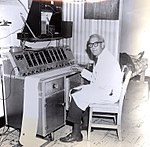Reformed Dutch Church of Blawenburg
19th-century Reformed Church in America church buildingsChurches completed in 1831Churches in Somerset County, New JerseyChurches on the National Register of Historic Places in New JerseyGeorgian architecture in New Jersey ... and 9 more
Historic district contributing properties in New JerseyIndividually listed contributing properties to historic districts on the National Register in New JerseyMontgomery Township, New JerseyNRHP infobox with nocatNational Register of Historic Places in Somerset County, New JerseyNew Jersey Register of Historic PlacesReformed Church in America churches in New JerseyReligious organizations established in 1832Use mdy dates from August 2023

Reformed Dutch Church of Blawenburg, now known as Blawenburg Reformed Church, is a historic church at 424 County Route 518 in the Blawenburg section of Montgomery Township in Somerset County, New Jersey. The Blawenburg Reformed Church Cemetery is located on County Route 601 near CR 518. The church was added to the National Register of Historic Places on July 22, 1985 for its significance in architecture and religion. It was added as a contributing property to the Blawenburg Historic District in 1990.
Excerpt from the Wikipedia article Reformed Dutch Church of Blawenburg (License: CC BY-SA 3.0, Authors, Images).Reformed Dutch Church of Blawenburg
Georgetown-Franklin Turnpike,
Geographical coordinates (GPS) Address External links Nearby Places Show on map
Geographical coordinates (GPS)
| Latitude | Longitude |
|---|---|
| N 40.408333333333 ° | E -74.699166666667 ° |
Address
Blawenburg Reformed Church
Georgetown-Franklin Turnpike 424
08558
New Jersey, United States
Open on Google Maps






